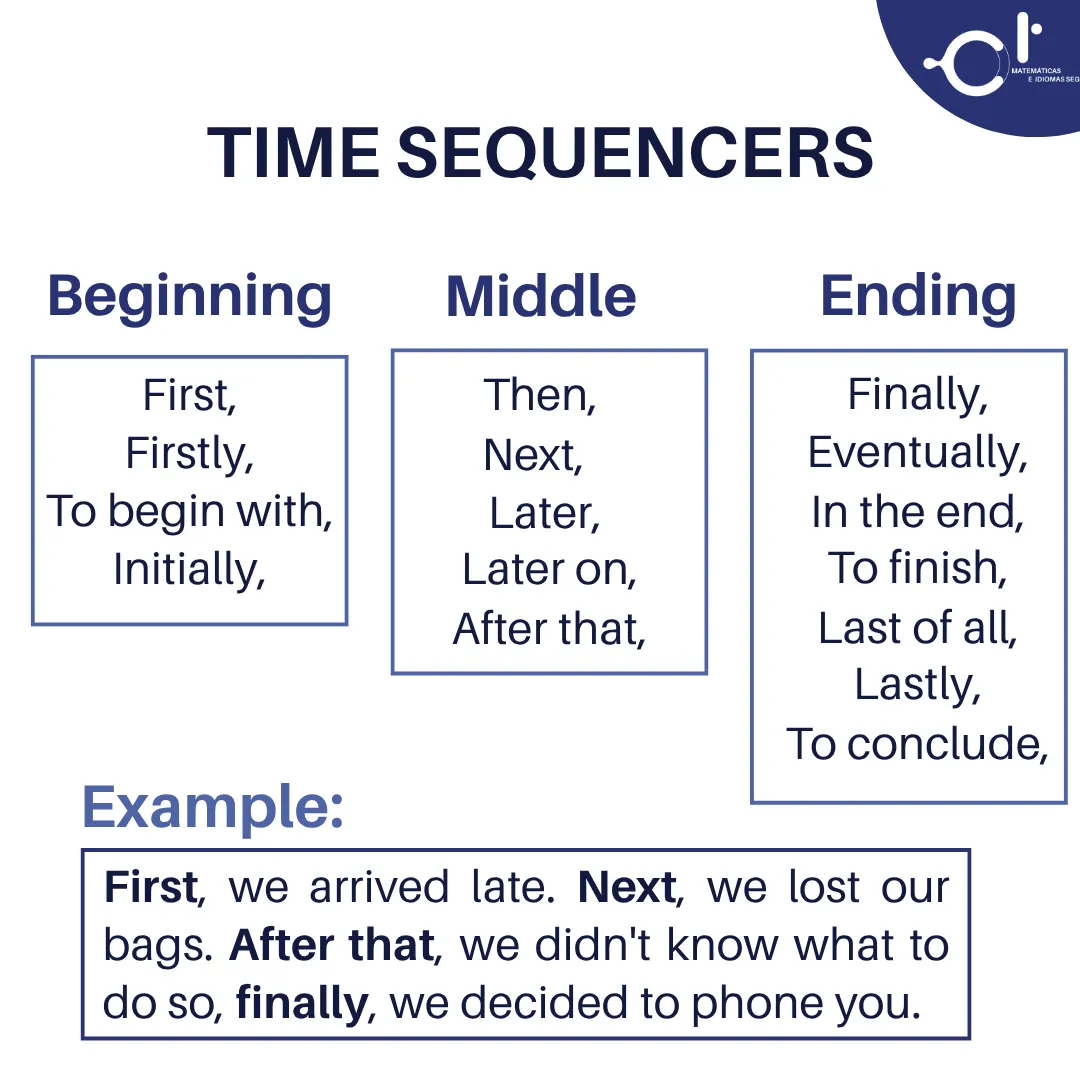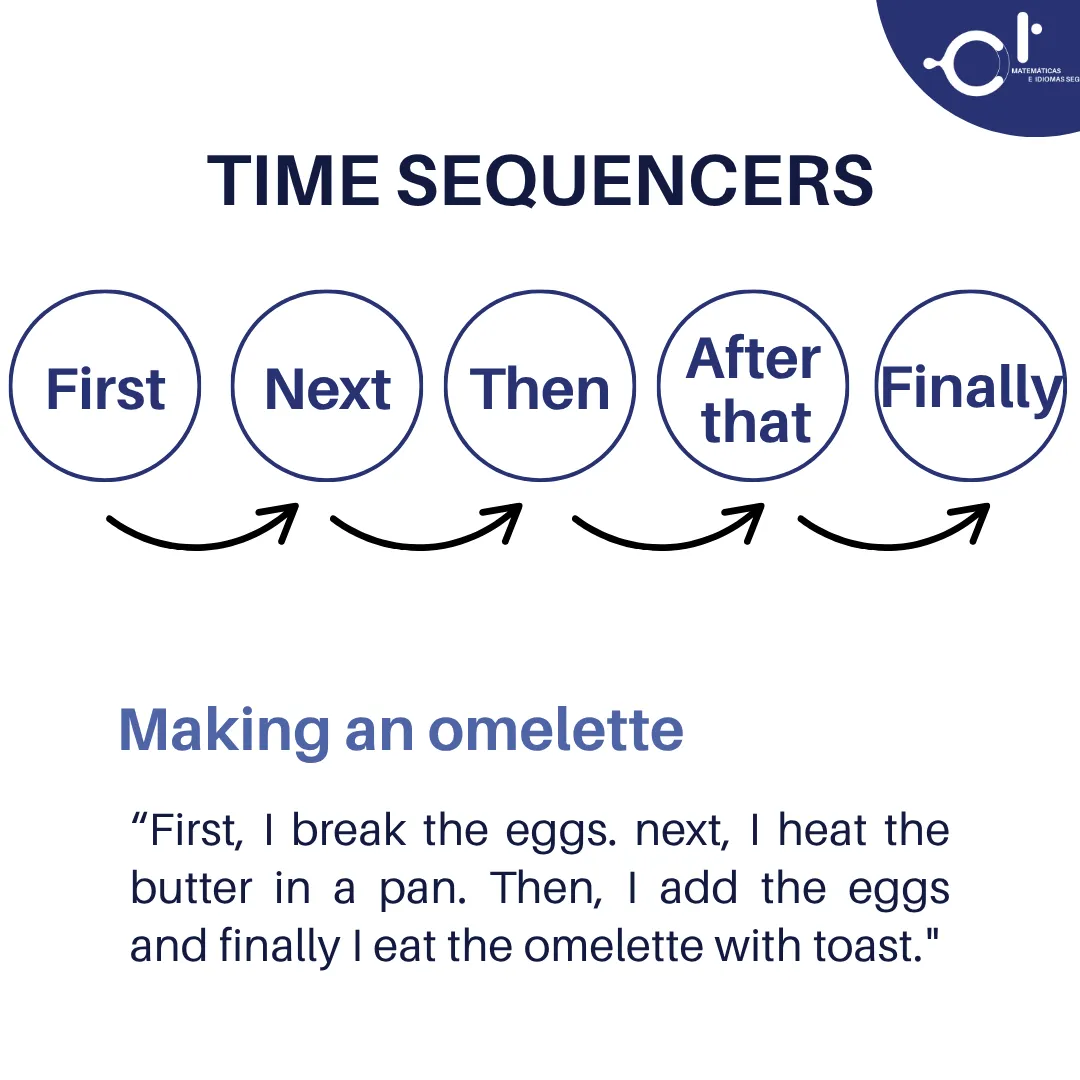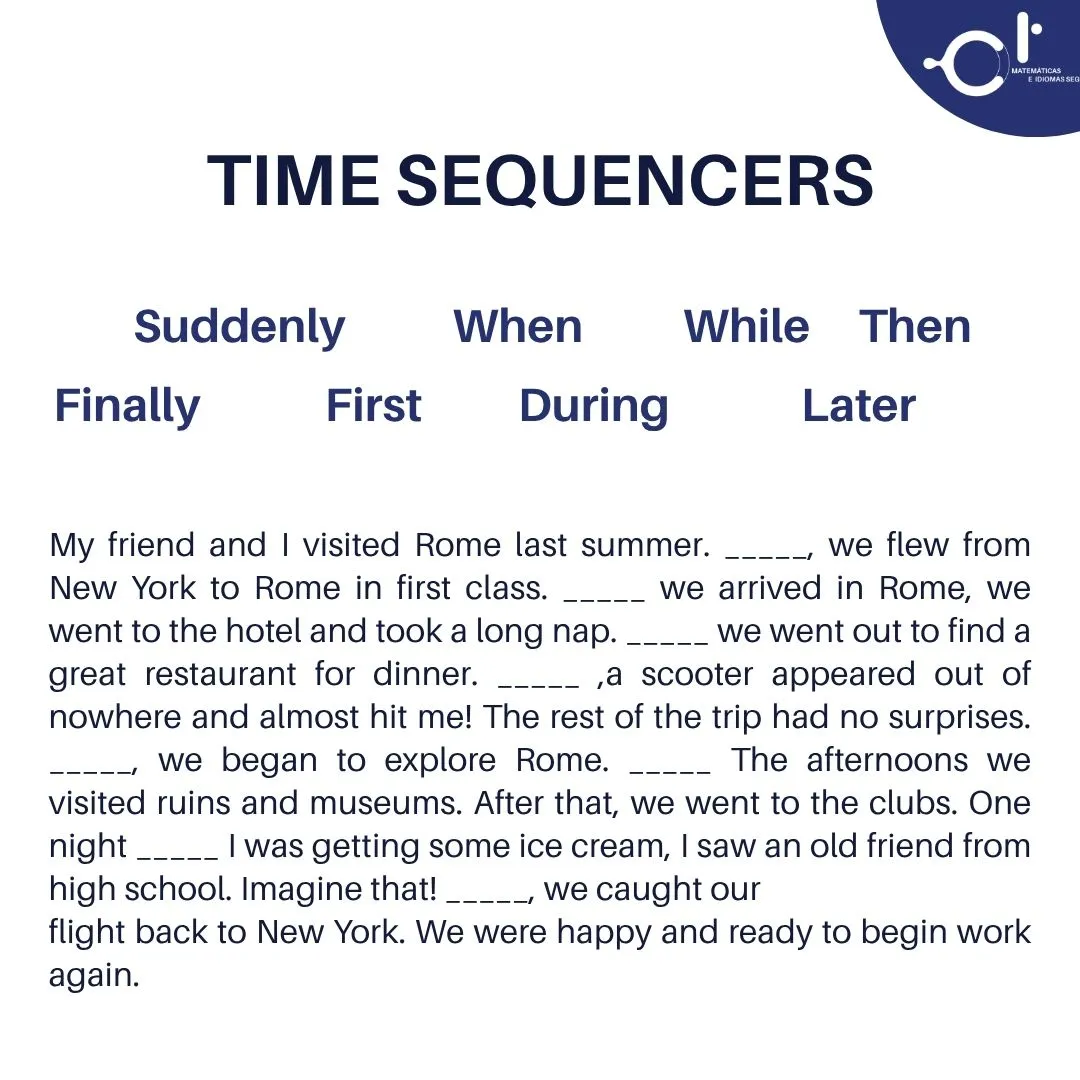¿Qué son los Time Sequencers y Connectors?
- Time Sequencers (Secuenciadores de Tiempo): Son palabras o frases que nos ayudan a indicar el orden cronológico en el que suceden los eventos. Responden a la pregunta “¿Cuándo?” o “¿En qué orden?”.
- Connectors (Conectores): Son palabras o frases que unen oraciones, frases o ideas para mostrar la relación lógica entre ellas. Pueden indicar causa y efecto, contraste, adición, propósito, etc.
I. Time Sequencers (Secuenciadores de Tiempo)
Estos son esenciales para contar una historia o describir un proceso paso a paso.
| Secuenciador | Significado | Ejemplo |
| First / Firstly | Primero / En primer lugar |
First, I woke up, then I had breakfast.
|
| Then | Luego / Entonces |
I finished my work, then I went home.
|
| Next | Después / Siguiente |
We bought the ingredients, next, we started cooking.
|
| After that / After | Después de eso / Después |
She studied for two hours. After that, she took a break.
|
| Before | Antes |
Before going to bed, I always read a book.
|
| While | Mientras |
While I was cooking, my brother was watching TV.
|
| As soon as | Tan pronto como |
As soon as I arrived, I called my family.
|
| Suddenly | De repente |
I was walking in the park. Suddenly, it started to rain.
|
| Eventually | Finalmente / Con el tiempo |
He worked hard for years and eventually became the manager.
|
| Finally / Lastly | Finalmente / Por último |
I packed my bags, locked the door, and finally left for the airport.
|
| At first | Al principio |
At first, I found English difficult, but now I enjoy it.
|
| In the end | Al final |
We faced many challenges, but in the end, we succeeded.
|
Notas importantes:
- A menudo usamos una coma después de los secuenciadores de tiempo al principio de una oración.
- “Then” y “Next” son muy similares. “Then” es más común para pasos consecutivos.

II. Connectors (Conectores)
Los conectores nos ayudan a mostrar relaciones más complejas entre ideas.
A. Adición (Addition)
Para añadir información.
| Conector | Significado | Ejemplo |
| And | Y | I like coffee and tea. |
| Also | También |
She’s a doctor. She’s also a talented painter.
|
| In addition (to) | Además (de) |
In addition to playing guitar, he also sings.
|
| Furthermore / Moreover | Además / Es más |
The food was delicious. Furthermore, the service was excellent.
|
| As well as | Además de / Así como |
He can speak French as well as German.
|
B. Contraste (Contrast)
Para mostrar una diferencia u oposición.
| Conector | Significado | Ejemplo |
| But | Pero |
It was raining, but we still went out.
|
| However | Sin embargo |
The movie was long. However, it was very interesting.
|
| Although / Though / Even though | Aunque / A pesar de que |
Although it was cold, we didn’t wear jackets.
|
| Despite / In spite of | A pesar de |
Despite the rain, we had a good time. (Despite + noun/gerund)
|
| Whereas / While | Mientras que / En cambio |
John likes sports, whereas Mary prefers reading.
|
C. Causa y Efecto (Cause and Effect)
Para explicar por qué algo sucede o cuál es el resultado.
| Conector | Significado | Ejemplo |
| Because | Porque |
I was late because of the traffic.
|
| So | Así que / Por lo tanto |
It was raining, so we stayed home.
|
| Therefore / Consequently | Por lo tanto / En consecuencia |
He didn’t study. Therefore, he failed the exam.
|
| As a result | Como resultado |
The team played badly. As a result, they lost the match.
|
| Due to / Owing to | Debido a |
The flight was delayed due to bad weather. (Due to + noun)
|
D. Propósito (Purpose)
Para indicar la razón o el objetivo de una acción.
| Conector | Significado | Ejemplo |
| To | Para (infinitivo) |
I went to the store to buy some milk.
|
| In order to | Para / Con el fin de |
She studies hard in order to pass her exams.
|
| So that | Para que |
He saved money so that he could buy a new car.
|

Ejercicios para Practicar
-
Completa las oraciones con el secuenciador de tiempo o conector adecuado de la lista:
- (first, then, after that, finally, suddenly, however, because, so)
- I woke up. ____, I brushed my teeth.
- It was raining, ____ I took an umbrella.
- We went to the restaurant, ____ we ordered food.
- She lost her job ____ the company closed.
- I was walking down the street. ____, I heard a strange noise.
- He wanted to go to the beach, ____ it was too cold.
- I sent the application. ____, I waited for a response.
-
Une las dos ideas usando el conector adecuado (but, although, in addition to, as well as, because):
- He’s good at math. He’s good at science.
- The car is old. It runs perfectly.
- She felt sick. She ate too much.
- I like reading. I like watching movies.
- She got the promotion. She also got a raise.
-
Escribe un pequeño párrafo (3-4 oraciones) describiendo tu rutina matutina o una experiencia reciente, usando al menos tres secuenciadores de tiempo diferentes.

